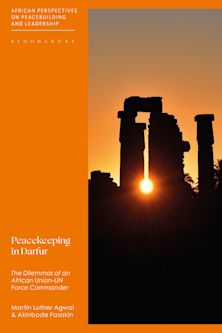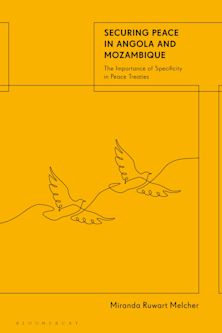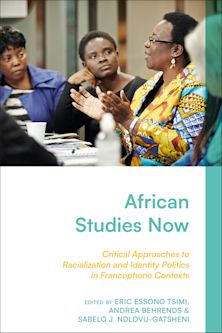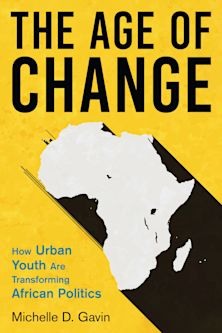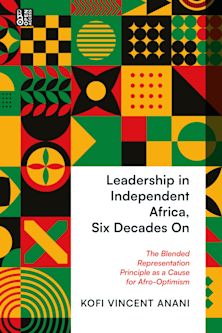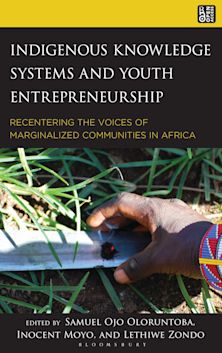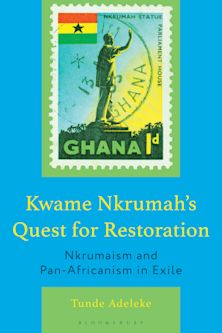- Home
- ACADEMIC
- Politics & International Relations
- African Politics
- Nigeria and the Nation-State
Nigeria and the Nation-State
Rethinking Diplomacy with the Postcolonial World
Nigeria and the Nation-State
Rethinking Diplomacy with the Postcolonial World
You must sign in to add this item to your wishlist. Please sign in or create an account
Description
Nigeria matters. It is Africa’s largest economy, and it is projected to become the third most populous country in the world by 2050, but its democratic aspirations are challenged by rising insecurity. John Campbell traces the fractured colonial history and contemporary ethnic conflicts and political corruption that define Nigeria today. It was not—and never had been—a nation-state like those of Europe. It is still not quite a nation because Nigerians are not yet united by language, religion, culture, or a common national story. It is not quite a state because the government is weak and getting weaker, beset by Islamist terrorism, insurrection, intercommunal violence, and a countrywide crime wave.
This deeply knowledgeable book is an antidote to those who would make the mistakes of Vietnam, Afghanistan, and Iraq—mistakes based on misunderstanding—in Nigeria. Up to now, such mistakes have largely been avoided, but Nigeria will soon—and Campbell argues already does—require much greater attention by the West.
Table of Contents
Acknowledgments
Author’s Note
Timeline of Nigerian Political History
Introduction
1 The Origins of Nigeria
2 Nigerians
3 The State of Nigeria
4 Sharing the Cake
5 Falling Apart?
6 International Relations and a Prebendal Archipelago
7 A New Approach
Conclusion: Thinking Differently
Notes
Selected Bibliography
About the Author
Product details
| Published | 02 Dec 2020 |
|---|---|
| Format | Ebook (PDF) |
| Edition | 1st |
| Extent | 312 |
| ISBN | 9798881878771 |
| Imprint | Rowman & Littlefield Publishers |
| Illustrations | 2 b/w illustrations;2 maps |
| Series | A Council on Foreign Relations Book |
| Publisher | Bloomsbury Publishing |
About the contributors
Reviews
-
Campbell (Nigeria: Dancing on the Brink), a senior fellow at the Council on Foreign Relations and former ambassador to Nigeria, documents the prospects and pitfalls facing Africa’s most populous country in this well-informed and highly specialized account. Chronicling the precolonial, colonial, and postindependence periods, Campbell cogently argues that Nigeria, divided by multiple languages, ethnicities, and religions, lacks a strong national identity . . . Packed with insider details of foreign policy-making and deep dives into Nigeria’s demographics and political history, this expert treatise will resonate with readers well-versed in the subject.
Publishers Weekly
-
Campbell’s main argument here is that American diplomacy toward Nigeria should cease to operate on the assumption that Nigeria is a “traditional” nation-state and should instead treat it more as a “prebendal archipelago” of loosely connected elite interests with largely predatory relationships to the national government.... the call from a former US ambassador to steer American diplomacy away from humoring a chronically corrupt and ineffective state and toward assisting Nigeria’s “better angels” engaged in anti-corruption and pro-democracy movements is a welcome intervention. Recommended.
Choice Reviews
-
Ambassador Campbell is an experienced US diplomat and longtime friend of Nigeria. This book provides candid insights into the dynamics, challenges, and pitfalls of Nigeria’s struggle to become a cohesive twenty-first-century polity and how our bilateral relations can be strengthened. I strongly recommend it to all who wish to understand one of the most consequential countries in the world.
John N. Paden, George Mason University
-
Nigeria, according to John Campbell, is ‘big, important, and troubled.’ Islands of authority are surrounded by seas of ungoverned spaces. At the heart of the Nigerian paradox is the persistence of a state that generates enormous benefits for elites while the population grows ever poorer. Campbell argues the need to ‘rethink Nigeria’ and calls for decentralized approaches to its multiplying travails. This timely book will be keenly read by scholars, diplomats, and the general public. They will be intrigued by an analysis applicable to many postcolonial entities in which elite predation and popular insecurity are interwoven.
Richard Joseph, Northwestern University
-
Nigeria is a pivotal state in Africa by virtue of its population, economic possibilities, fledgling democracy, and regional position. Yet the country has perennially struggled with political instability, economic stagnation, corruption, and internal conflict. John Campbell is among the most astute observers of Nigeria and a thoughtful voice on US relations with the continent. His prescriptions in this book draw upon realistic assessments of the Nigeria prospect and the potential of American policy.
Peter Lewis, Johns Hopkins University
-
Drawing on his long experience, deep knowledge, and remarkable career as a diplomat, together with the rich sources of information he has gathered from scholars, public intellectuals, and activists, John Campbell provides rich insights into the social, political, and economic life of Nigeria. His perceptive analysis of the difficult terrain and multiple challenges the country has faced over its sixty years of independence make his timely book an essential resource for understanding Nigeria’s place— past and present—in the world today.
Jacob Olupona, Harvard University












